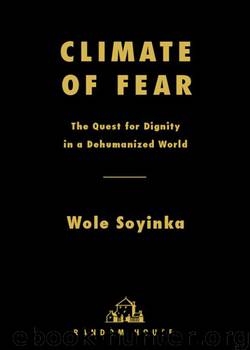Climate of Fear by Wole Soyinka

Author:Wole Soyinka
Language: eng
Format: epub
Tags: Fiction
ISBN: 9780307430823
Publisher: Random House Publishing Group
Published: 2007-12-17T16:00:00+00:00
Four
The Quest for Dignity
The Times newspaper of London, on Saturday, February 21 of this year, carried the story of the suicide of a teenager in Belfast, Northern Ireland. Apparently, it should have been a double suicide, but that youth, after yet another bout of humiliation from his tormentors, decided that he simply could not wait. He was one of a close-knit group of seven, the report continues, who had attended school together and continued to spend all their spare time together. Of the seven, only two still survive. The motor accident that earlier took the lives of three of them may not have been deliberate, but it is on record that one of those three had also once attempted suicide. All lived in fear of some degrading punishment by the local vigilantes known as the INLA. In one case, a fourteen-year-old boy suspected of being a police informer was tarred and feathered, dragged through the streets, then “kneecapped”—that is, shot through the back of the knee, crippling the youth for life. Here is what a consulting psychiatrist in north Belfast had to say:
In a culture where it is acceptable for a young man to be dragged down an alleyway and shot, children grow up believing there is no such thing as respect for human dignity. They . . . often develop anxiety and a fatalistic approach to their own lives.
Now, why did the psychiatrist settle on that word “dignity” over others in his clinical notebook? Why had this youth—as had others—chosen to embrace death rather than live but be publicly tarred and feathered and/or kneecapped, subjected thereafter to cruel taunts by his own-age mates—we learn—who called out to the fourteen-year-old, knowing he had been crippled, “Come out, Barney, come out and play”?
We are trying to come to grips with the concept of “dignity,” and why it appears to mean so much to the sentient human, almost right from childhood. Why has it been entrenched in so many social documents across cultures, civilizations, and political upheavals? Why was it given such prominence in the charter that resulted from one of the bloodiest revolutions in human history—the French—and was further enshrined in the document for the enthronement of peace after the Second World War, the Universal Declaration of Human Rights? In one form or another, the quest for human dignity has proved to be one of the most propulsive elements for wars, civil strife, and willing sacrifice. Yet the entitlement to dignity, enshrined among these human rights, does not aspire to being the most self-evident, essential need for human survival, such as food or physical health. Compared to that other candidate for the basic impulse of human existence—self-preservation—it may even be deemed self-indulgent.
Here is another incident from real life, involving, this time, not an individual but a nation, an attempt at breaking out from a walling in, a contesting of the reduction of volition, this time largely of the economic kind. About six years ago, I was approached by a Cuban ambassador to Nigeria with whom I had developed a warm relationship.
Download
This site does not store any files on its server. We only index and link to content provided by other sites. Please contact the content providers to delete copyright contents if any and email us, we'll remove relevant links or contents immediately.
Cecilia; Or, Memoirs of an Heiress — Volume 1 by Fanny Burney(32544)
Cecilia; Or, Memoirs of an Heiress — Volume 2 by Fanny Burney(31942)
Cecilia; Or, Memoirs of an Heiress — Volume 3 by Fanny Burney(31928)
The Great Music City by Andrea Baker(31916)
We're Going to Need More Wine by Gabrielle Union(19033)
All the Missing Girls by Megan Miranda(15945)
Pimp by Iceberg Slim(14484)
Bombshells: Glamour Girls of a Lifetime by Sullivan Steve(14052)
For the Love of Europe by Rick Steves(13898)
Norse Mythology by Gaiman Neil(13345)
Talking to Strangers by Malcolm Gladwell(13345)
Fifty Shades Freed by E L James(13232)
Mindhunter: Inside the FBI's Elite Serial Crime Unit by John E. Douglas & Mark Olshaker(9318)
Crazy Rich Asians by Kevin Kwan(9275)
The Lost Art of Listening by Michael P. Nichols(7489)
Enlightenment Now: The Case for Reason, Science, Humanism, and Progress by Steven Pinker(7306)
The Four Agreements by Don Miguel Ruiz(6744)
Bad Blood by John Carreyrou(6610)
Weapons of Math Destruction by Cathy O'Neil(6264)
